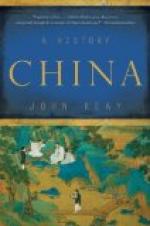In addition to encyclopaedias and historical works, many books of philosophy were written in the Han period, but most of them offer no fundamentally new ideas. They were the product of the leisure of rich members of the gentry, and only three of them are of importance. One is the work of Tung Chung-shu, already mentioned. The second is a book by Liu An called Huai-nan Tz[)u]. Prince Liu An occupied himself with Taoism and allied problems, gathered around him scholars of different schools, and carried on discussions with them. Many of his writings are lost, but enough is extant to show that he was one of the earliest Chinese alchemists. The question has not yet been settled, but it is probable that alchemy first appeared in China, together with the cult of the “art” of prolonging life, and was later carried to the West, where it flourished among the Arabs and in medieval Europe.
The third important book of the Han period was the Lun Heng (Critique of Opinions) of Wang Ch’ung, which appeared in the first century of the Christian era. Wang Ch’ung advocated rational thinking and tried to pave the way for a free natural science, in continuation of the beginnings which the natural philosophers of the later Chou period had made. The book analyses reports in ancient literature and customs of daily life, and shows how much they were influenced by superstition and by ignorance of the facts of nature. From this attitude a modern science might have developed, as in Europe towards the end of the Middle Ages; but the gentry had every reason to play down this tendency which, with its criticism of all that was traditional, might have proceeded to




